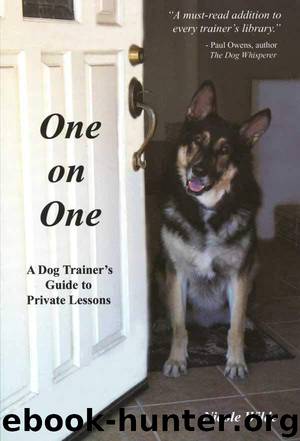One on One by Nicole Wilde

Author:Nicole Wilde
Language: eng
Format: mobi
Tags: Book, ebook, Dogs
Publisher: Dogwise
Published: 2012-02-15T22:00:00+00:00
Questionnaire: Training
Has the dog had any previous training? (Describe familiar cues, training methods, and who did the training.)
The most obvious reason to ask what cues the dog already knows is so you do not waste time and energy re-teaching them. But if an owner says the dog has had previous training, do not assume the dog knows and will respond to those cues. Ask specifically whether the dog will respond to learned cues reliably in the house and outdoors with its many distractions. Let’s say Brenda tells you that Buddy knows “Come!” If you leave it at that, you might miss the fact that although Buddy understands what the word means, he will not respond to it once he has darted out the front door, when off-leash at the park, or even at times in the house with no distractions! Persevere in your questioning until you get specific information, including whether the dog will respond to the cue when given by each family member.
It is perfectly acceptable to ask owners to demonstrate skills the dog already knows. If Brenda says Buddy knows sit, down, stay and come, ask her to put him through his paces, in whatever manner she would normally use. You might find that although she says Buddy knows a certain cue, he has not practiced it since four years ago in puppy class. Also, her idea of Buddy “knowing” a cue might not be the same as yours. For example, Brenda might believe Buddy’s knowing “down” means he will do it when asked, even though he pops right back up; or that Buddy lies down when asked—after being asked five times.
When responding to the “previous training” question, a client might offer the name of a trainer or training academy, or mention the methods used. That could provide a clue as to what the dog has already experienced, for better or worse. It is not necessary to ask for the specific name of a previous trainer, but it is good to know whether the client trained the dog herself, attended a group class, or had previous private training.
If an owner recites a long list of trainers who have previously tried and failed to train the dog, or makes derogatory comments about a previous trainer, consider it a red flag. Sure, there are bad trainers out there and the training failure could be on the part of the trainer or the methods used. But it is also very possible that the owner never followed through with suggestions those trainers made. Tread carefully when discussing other trainers. Do not make or agree with disparaging remarks; doing so would only make you appear unprofessional. And be careful to monitor your client’s progress at each session so you know she has been working with the dog. If you find vist after visit that no effort has been made, consider terminating the relationship, lest you be added to that list of failed trainers. (For more on terminating training relationships see Miscellaneous Questions.)
In some cases, previous training methods can explain a dog’s present behavior.
Download
This site does not store any files on its server. We only index and link to content provided by other sites. Please contact the content providers to delete copyright contents if any and email us, we'll remove relevant links or contents immediately.
Finding Gobi by Dion Leonard(2842)
Grumpy Cat by Grumpy Cat(2758)
A New Earth: Awakening to Your Life's Purpose by Eckhart Tolle(2653)
The Silkworm by Robert Galbraith(2497)
Tippi by Tippi Hedren(2241)
End of Days by Sylvia Browne(2187)
Total Cat Mojo by Jackson Galaxy(2005)
Backyard Chickens Beyond the Basics by Pam Freeman(1944)
Penguin Bloom by Cameron Bloom(1935)
The Animals Among Us by John Bradshaw(1865)
The Ultimate Pet Health Guide by Gary Richter(1762)
All Things Bright and Beautiful by James Herriot(1754)
The Plant-Based Dog Food Revolution by Mimi Kirk(1712)
Vet in Harness by James Herriot(1703)
Doggy Desserts: 125 Homemade Treats for Happy, Healthy Dogs by Cheryl Gianfrancesco(1685)
Dog Years by Mark Doty(1681)
Cesar's Way by Cesar Millan(1677)
Chicken Soup for the Ocean Lover's Soul by Jack Canfield(1646)
Animal Speak by Ted Andrews(1626)
